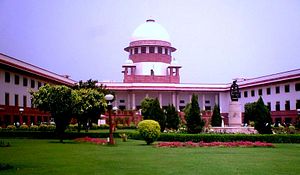On January 2, 2017, the Supreme Court of India declared that seeking votes in the name of religion was illegal, based on the majority opinion of a seven-judge constitutional bench. They argued that the election process must be a “secular exercise” and felt that use of religious rhetoric and appeals diluted this ideal.
Explaining that elections that operated on identity-based rhetoric would effectively be void, the bench said that no votes must be sought in the name of caste, creed, or religion. However, this was a 4:3 verdict in favor of the majority opinion and the dissenting judges’ key argument was that this was a matter best left to the parliament. A failure to do so could very well constitute “judicial redraft of the law” and reduce “democracy to a mere abstraction.”
This judgment was made while revisiting previous ones, in particular a 1995 verdict on the concept of “Hindutva.” The court in that instance ruled that references to Hinduism or the specific political enunciation of Hindutva were outside the ambit of religion, as they constituted a way of life.
This meant that such references did not violate Section 123 of the People’s Representation Act (1951), which forbade a candidate or a candidate’s agents from canvassing for votes on grounds of his religion, caste, race, etc. The question of what “his” meant in this context is perceived as having been central to the verdict, and the majority judgment seems to indicate that it refers to all religion in a blanket manner, thereby including that of the voter.
In the lead up to elections in five states – Uttar Pradesh, Uttarakhand, Punjab, Goa, and Manipur – this verdict becomes particularly important, as campaigning on the grounds of core identities like religion or caste is both a rampant practice and common strategy for multiple parties across the board and across electoral levels in India. However in the weeks since the Court’s verdict, the reactions of the parties have interestingly mostly been in support of the verdict.
The Congress Party has said through their spokesperson, for example, that they welcomed this message from the Supreme Court and snidely alluded to parties that had made religion part of their ideology in order to rise in Indian politics, hinting at the ruling Bharatiya Janata Party (BJP).
The BJP on the other hand appears to be attempting to sidestep such accusations. In a public speech in the city of Lucknow, Prime Minister Narendra Modi asked voters to rise above the politics of religion or caste and vote for development. Further, officials like Home Minister Rajnath Singh have said that the BJP has never been involved in the politics of polarization and instead warned secular parties to be wary of the verdict – snidely referring to the Congress in turn.
The Communist Party of India (Marxist), however, blamed both mainstream parties – the Congress and the BJP – for resorting to such strategies and described the verdict as a triumph for secularism. The CPI(M) further made a statement that it would abide by the rule, as it has done traditionally anyway. The Communist Party of India, meanwhile, agreed with the move and both the Viswa Hindu Parishad and the Jamaat-e-Islami Hind came out in support of the strict enforcement of this judgment.
Against this climate, the Court’s verdict poses several dilemmas for the upcoming months of campaigning. To begin with, multiple parties, including the ones that have made supportive statements, have religion built into both their names and primary identities.
And in the contentious election states, regional parties like Shiromani Akali Dal (in Punjab) or the Trinamool Congress (in Uttar Pradesh) use religion- and caste-based rhetoric heavily in their core campaigns. The mainstream national parties are of course no exception to this rule – although they differ in the groups they attempt to mobilize, they indulge in their fair share of polarizing rhetoric.
The broader questions of whether a secular election must indeed display a thorough absence of religion or whether this kind of secularism is complementary to Indian diversity — especially when individuals see religion or caste as important to representation — still looms large.
Finally, it remains to be seen whether this verdict will indeed impact the more prominent and obviously religious-rhetoric-based campaigning of parties that have had decades to solidify their stances and carve out a niche. More frighteningly and very possibly, the smaller parties and more invisible minorities who rely on campaigns to grab at representation may see their clout in politics evaporate.

































